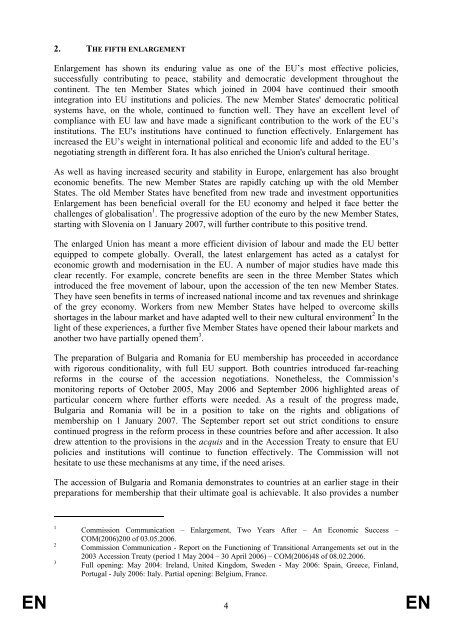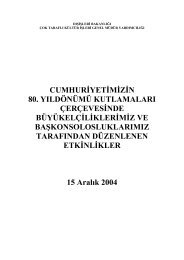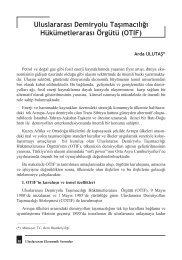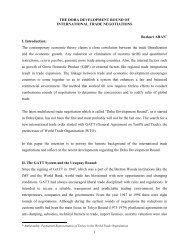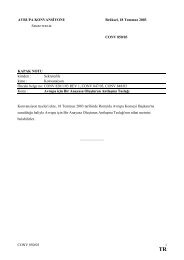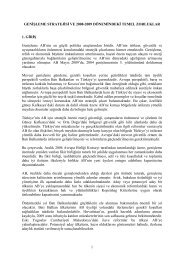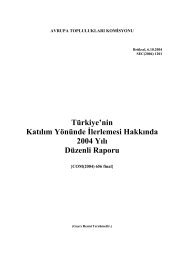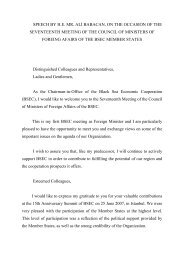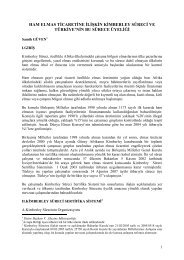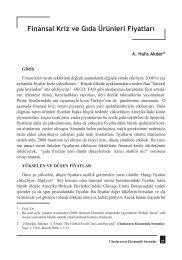Enlargement Strategy and Main Challenges 2006 - 2007
Enlargement Strategy and Main Challenges 2006 - 2007
Enlargement Strategy and Main Challenges 2006 - 2007
Create successful ePaper yourself
Turn your PDF publications into a flip-book with our unique Google optimized e-Paper software.
2. THE FIFTH ENLARGEMENT<br />
<strong>Enlargement</strong> has shown its enduring value as one of the EU’s most effective policies,<br />
successfully contributing to peace, stability <strong>and</strong> democratic development throughout the<br />
continent. The ten Member States which joined in 2004 have continued their smooth<br />
integration into EU institutions <strong>and</strong> policies. The new Member States' democratic political<br />
systems have, on the whole, continued to function well. They have an excellent level of<br />
compliance with EU law <strong>and</strong> have made a significant contribution to the work of the EU’s<br />
institutions. The EU's institutions have continued to function effectively. <strong>Enlargement</strong> has<br />
increased the EU’s weight in international political <strong>and</strong> economic life <strong>and</strong> added to the EU’s<br />
negotiating strength in different fora. It has also enriched the Union's cultural heritage.<br />
As well as having increased security <strong>and</strong> stability in Europe, enlargement has also brought<br />
economic benefits. The new Member States are rapidly catching up with the old Member<br />
States. The old Member States have benefited from new trade <strong>and</strong> investment opportunities<br />
<strong>Enlargement</strong> has been beneficial overall for the EU economy <strong>and</strong> helped it face better the<br />
challenges of globalisation 1 . The progressive adoption of the euro by the new Member States,<br />
starting with Slovenia on 1 January <strong>2007</strong>, will further contribute to this positive trend.<br />
The enlarged Union has meant a more efficient division of labour <strong>and</strong> made the EU better<br />
equipped to compete globally. Overall, the latest enlargement has acted as a catalyst for<br />
economic growth <strong>and</strong> modernisation in the EU. A number of major studies have made this<br />
clear recently. For example, concrete benefits are seen in the three Member States which<br />
introduced the free movement of labour, upon the accession of the ten new Member States.<br />
They have seen benefits in terms of increased national income <strong>and</strong> tax revenues <strong>and</strong> shrinkage<br />
of the grey economy. Workers from new Member States have helped to overcome skills<br />
shortages in the labour market <strong>and</strong> have adapted well to their new cultural environment 2 In the<br />
light of these experiences, a further five Member States have opened their labour markets <strong>and</strong><br />
another two have partially opened them 3 .<br />
The preparation of Bulgaria <strong>and</strong> Romania for EU membership has proceeded in accordance<br />
with rigorous conditionality, with full EU support. Both countries introduced far-reaching<br />
reforms in the course of the accession negotiations. Nonetheless, the Commission’s<br />
monitoring reports of October 2005, May <strong>2006</strong> <strong>and</strong> September <strong>2006</strong> highlighted areas of<br />
particular concern where further efforts were needed. As a result of the progress made,<br />
Bulgaria <strong>and</strong> Romania will be in a position to take on the rights <strong>and</strong> obligations of<br />
membership on 1 January <strong>2007</strong>. The September report set out strict conditions to ensure<br />
continued progress in the reform process in these countries before <strong>and</strong> after accession. It also<br />
drew attention to the provisions in the acquis <strong>and</strong> in the Accession Treaty to ensure that EU<br />
policies <strong>and</strong> institutions will continue to function effectively. The Commission will not<br />
hesitate to use these mechanisms at any time, if the need arises.<br />
The accession of Bulgaria <strong>and</strong> Romania demonstrates to countries at an earlier stage in their<br />
preparations for membership that their ultimate goal is achievable. It also provides a number<br />
1<br />
Commission Communication – <strong>Enlargement</strong>, Two Years After – An Economic Success –<br />
COM(<strong>2006</strong>)200 of 03.05.<strong>2006</strong>.<br />
2<br />
Commission Communication - Report on the Functioning of Transitional Arrangements set out in the<br />
2003 Accession Treaty (period 1 May 2004 – 30 April <strong>2006</strong>) – COM(<strong>2006</strong>)48 of 08.02.<strong>2006</strong>.<br />
3<br />
Full opening: May 2004: Irel<strong>and</strong>, United Kingdom, Sweden - May <strong>2006</strong>: Spain, Greece, Finl<strong>and</strong>,<br />
Portugal - July <strong>2006</strong>: Italy. Partial opening: Belgium, France.<br />
EN 4 EN


